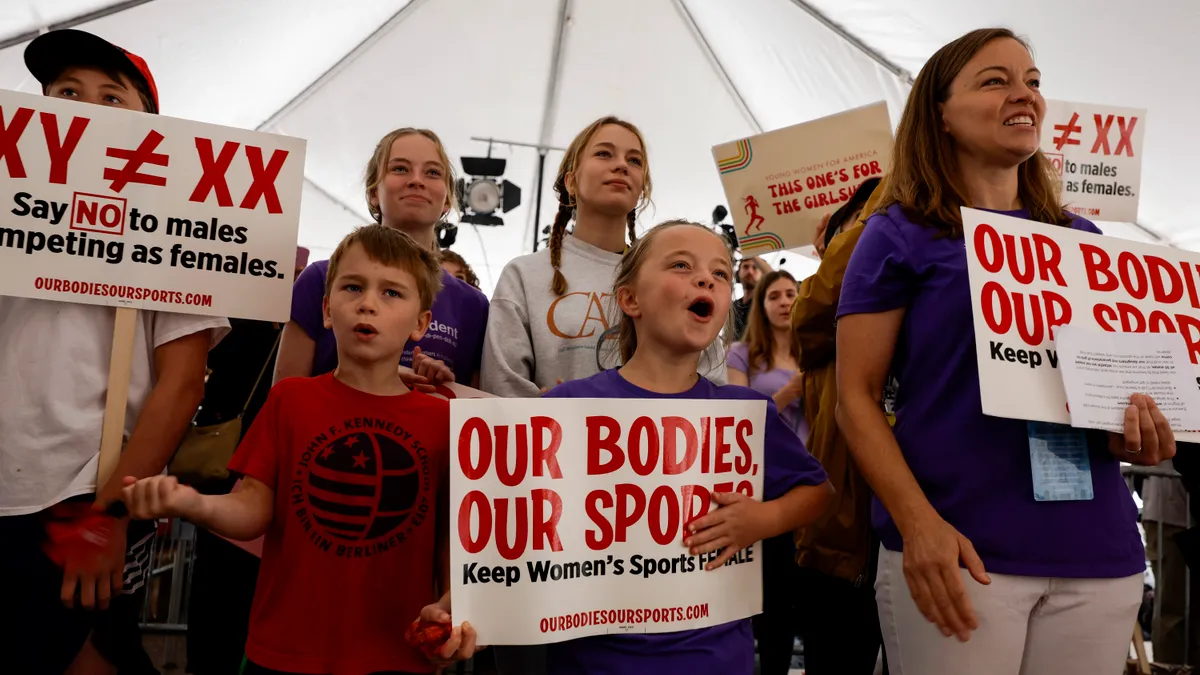Dive Brief:
- Federal agencies can’t compel members of a Christian employer coalition to pay for or provide gender transition services, including surgeries, procedures, counseling or other treatment, a federal district court in North Dakota ruled March 4.
- In Christian Employers Alliance v. U.S. Equal Employment Opportunity Commission, the CEA sued to stop the EEOC and the U.S. Department of Health and Human Services from enforcing against its members provisions of Title VII of the Civil Rights Act of 1964 and the Patient Protection and Affordable Care Act (ACA) that prohibit certain entities receiving federal assistance from denying benefits on the basis of gender identity.
- The court granted CEA’s request for a permanent injunction. It agreed with CEA that the mandates violate its members’ sincerely held religious beliefs as protected by the First Amendment and the Religious Freedom Restoration Act, and that the EEOC and HHS failed to show the mandates are the “only feasible means” to achieve a compelling government interest in protecting transgender patients’ right to access healthcare.
Dive Insight:
It’s been almost four years since the U.S. Supreme Court decided Bostock v. Clayton County, Ga., escalating an already high-profile debate between rights asserted by Christian and other employers to freely exercise their religious beliefs and the rights of LGBTQ+ individuals to be free from discrimination because of their sexual orientation or gender identity.
Bostock held that under Title VII, employment discrimination on the basis of sex includes discrimination based on someone’s sexual orientation or gender identity. The ruling also shows the tension between Title VII and RFRA, which prohibits the government from substantially burdening a person’s religious exercise, “unless imposing such a burden is the least restrictive means of furthering a compelling government interest,” the court explained here.
EEOC efforts to enforce Bostock have not gone unchallenged. In October 2022, a federal judge in Texas became the second federal judge, following a ruling in Tennessee, to enjoin the agency from enforcing a 2021 technical assistance document on LGBTQ+ workplace discrimination protections. The Texas judge said the EEOC incorrectly applied Bostock to cover all correlated conduct, including policies regarding employee dress and bathroom and pronoun use.
Also since Bostock, Supreme Court rulings have strengthened religious freedoms in the work environment. For example, last June, in Goff v. DeJoy, the justices unanimously overturned a 40-year, employer-favorable precedent regarding religious accommodations and made it more difficult for employers to reject an employee’s religious accommodation request under Title VII.
The CEA case involves a different kind of workplace religious rights claim: the right of an employer to exercise sincerely held religious beliefs or practices that conflict with federal or state law anti-discrimination mandates — here, the mandates being federal law protections for LGBTQ+ individuals.
CEA describes itself as a “Christian membership ministry” that exists, in part, “to support Christian employers ... so that they ... may provide health or other employment related benefits to their respective employees ... in a manner that is consistent with Christian values,” according to court documents. These values include the belief that “male and female are immutable realities defined by biological sex” and that “gender reassignment is contrary to Christian Values,” court documents said.
At issue in the case is a provision of Title VII prohibiting education programs or activities receiving federal financial assistance from excluding or denying benefits to any individual on the basis of sex, which now, under Bostock, includes gender identity.
The case also involves Section 1557 of the ACA, which prohibits any federally funded or administered health program from engaging in discrimination under four civil rights statutes, including Title IX of the Education Amendments of 1972, the court explained in an earlier ruling. Title IX prohibits discrimination on the basis of sex and allows administrative agencies to revoke federal funding for an offending health program or activity.
CEA filed suit in 2022 after HHS issued a guidance stating that federally funded entities will likely violate Section 1557 if they restrict “an individual’s ability to receive medically necessary care, including gender-affirming care, from their health care provider solely on the basis of sex assigned at birth.”













